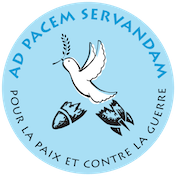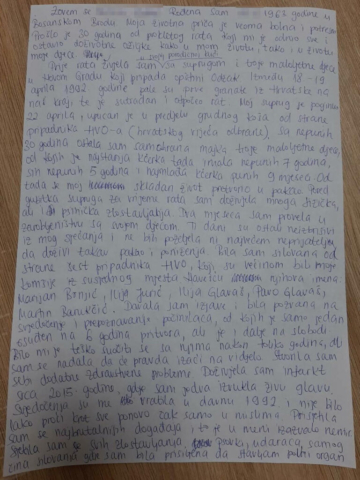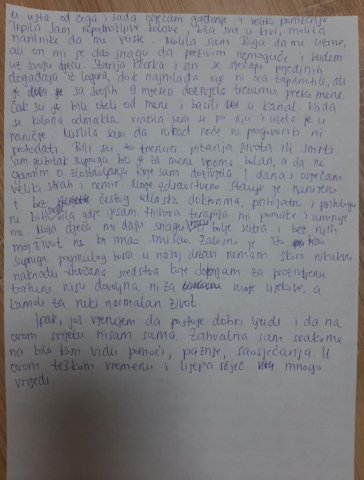The association “Forum zena” and three Bosnian women who received our financial support with the money from the sale of the Ad Pacem 2022 calendar:
History of the organisation
The Association “Women’s Forum” Bratunac (Udruženje “Forum žena” Bratunac) is a non-governmental organisation founded in 1999 in Bratunac. Since its establishment, it committed to promoting women’s participation in peacebuilding and reconciliation by advocating for the rights of women and girls in order to re-establish dialogue between women from different ethnic groups. The organisation operates in the Srebrenica region, where women and children were subjected to various forms of torture during the war.
From the beginning, the organisation has provided psychological support to women and girls by offering them a safe place to share their stories of trauma and develop mutual understanding. Many women and girls continue to suffer from denial and neglect by authorities and public service providers and are still one of the most marginalised groups in Bosnia and Herzegovina, unable to access justice, truth, or reparation. Today, they pass on their feelings to new generations through family narratives, thus influencing and shaping the lives of the next generations by passing on transgenerational trauma.
The war in Bosnia and Herzegovina ended before the end of 1995, but a lasting peace has yet not been established. The prosecution of war crime suspects continues to this day, and citizens are also psychologically burdened by the media coverage of the trials. Although annual collective commemorations of suffering and mass visits to execution sites are important events that help survivors cope with tragic events, they can increase stress and grief reactions (re-traumatisation).
Even 27 years after the end of the war in Bosnia and Herzegovina, no transitional justice strategy has been adopted to help citizens deal with the past and eliminate those responsible from institutional and political life through lustration or vetting.
It is often the case that victims, as well as those who were part of the military system or formations during the war, are now employed in public institutions, which only increases mistrust. This is particularly evident on the local level, where trust in education, health and security systems is of great importance.
As part of its work, the association often helps its beneficiaries with their daily needs, for example by offering home delivery (food, medicine, etc.), accompanying them to health or social institutions, etc., as there are many elderly women who have lost family members and live alone. These women are back in the rural areas of Bratunac and Srebrenica municipalities where public transport does not work, which makes their daily life even more difficult.
Since 2010, the organisation has been engaged in the implementation of UNSCR 1325 as part of the National Action Plan (NAP) on UNSCR 1325 “Women, Peace and Security” in Bosnia and Herzegovina. The focus is on increasing the participation of women and girls in decision-making positions in a post-conflict society. This is an ongoing process where the association works simultaneously with young women and girls who are active members of political parties and youth organisations by supporting their political performance and education in line with UN Security Council Resolution 1325, so that they can advocate for a violence-free society and greater visibility of women and girls in the community.
In addition, the association frequently organises joint meetings involving women survivors of war and gender-based violence, potential candidates, and women in decision-making positions. In this way, survivors of violence have the opportunity to talk about their problems and needs, and women politicians can better represent their needs.
Unfortunately, most of the needs and priorities of women are not sufficiently recognised by donors or policies in Bosnia and Herzegovina. Priority is mainly given to economic empowerment, without full legal and psychological support for women and girls, who are underrepresented in decision-making positions.
M. B.
M. B. was born in 1951 in Hadžići, in the village of Odžak.
“At the beginning of the war, I was 41 years old and lived with my mother in our family house in the village of Odžak in the municipality of Hadžići. I was not married, but I was employed in the company “Bosanka”. Until the war, I had a fulfilling life. I still don’t know today how the war started or why it had to happen, or why I had to live to see that my life and my mother’s life had to change in one day. When the army broke into our house, they told us that we were not allowed to leave the house and that if we were noticed outside our yard, we would be dead.
From that day on, our house was effectively a prison for us. The phone lines were cut, and we were isolated, with no information about what was going on. That summer (1992) we thought we would have food because we lived in a village, and we thought the war would end soon. We stayed in our house until 1993. I never knew when they would come to our house to abuse us, and it was not only the soldiers but also our recent neighbours who insulted us, threw stones at our house, and took our cattle and food.
I have forgiven them for all this, but I cannot forgive the humiliation of sexual abuse that my mother had to listen to or sometimes even watch. It still haunts me today when my mother is dead, and since 1993 when we were exchanged, until her death, we never discussed what happened in our house during that time.
I never talked about it in detention in Pale, because nobody asked us what we had experienced and suffered, but they put us in a reception centre outside the city. A month after we arrived in Pale, my mother passed away.
In November 1995, we were told that those who wanted could go to Bratunac because the municipality was determined to take the refugees from Hadžići. We were placed in collective centres outside the town and received humanitarian aid containing food and hygiene items.
Since then, more than 7000 refugees from Hadžići have come to Bratunac but we have not mixed much with the local citizens. We heard that there was a women’s association and that we could come there freely to talk.
I could write a book about my experiences, but as soon as I start writing I am overwhelmed and images and memories come back to me, of my house and what I experienced there. I have never returned to the place of my and my mother’s suffering. I sold the house in 2005 and now live in a studio. I live with my grief, and my pain and I live by cleaning the stairs and the flats of the women employees.
In the association I had the opportunity to talk to other women who were also in real camps or camps of origin and who suffered different forms of torture during the war; I now have friends who understand me, and we support each other.”
In Bratunac, 28 April 2022. M. B.
J. J.
J. J. was born in 1947 in the village of Ježestica, municipality of Bratunac.
“I got married and went to the village Čumavići, municipality of Srebrenica, where I lived with my family until the war started in 1992. My family was involved in agriculture, and this was our main source of income. I gave birth to four children during my marriage to my husband, three sons and one daughter.
At the beginning of the war in Bosnia and Herzegovina, I was detained with my family and neighbours from the village of Čumavići, in the municipality of Srebrenica, and we were placed in the Donji Potočari camp. I was detained in the camp from 6 May 1992 to 13 June 1993. During this period, together with the prisoners, I was exposed to various forms of physical, mental, and sexual torture.
Two of my sons were with me in the camp, as well as my husband and mother-in-law, who were also mistreated. To this day, I still can’t decide which was harder for me, the fact that I was abused or the fact that my children were abused.
My eldest son, who was an adult, was physically abused and beaten to the point of exhaustion. The hardest thing for me was seeing my son unconscious and covered in blood and not being allowed to help him.
My youngest son, who was still a minor during his captivity, was taken away several times to be executed. They asked me to choose a weapon or tool they would use to kill him. I begged them to kill me first, not wanting to see my child abused.
My husband and other men were also abused, both physically and mentally. They were beaten in front of us. We were forced to watch them being physically abused, without being able to help them.
The women and girls who were in captivity with me were physically and sexually abused. We were taken for questioning and brought back to the group after 4 or 5 hours. The hardest thing for us was that our relatives knew what they were doing to us, but they never asked. The older women usually handed us water and washed our faces so that we would come to our senses. None of us approached each other or spoke because we knew what each of us had experienced. Some of them never recovered and two died soon after leaving the camp.
Then one day they came, took us all out of the camp and told us that we were going to Bratunac for an exchange.
Immediately after the exchange, we learned that the prisoners from Srebrenica municipality had been released because the International Red Cross was about to arrive.
After the exchange, the tragedy continued in my family because my husband and my eldest son died as a result of the abuse they had suffered. Unfortunately, they were not the only ones, as two women who were in captivity also died.
I never returned to my house, and I have been living alone with my grief in Bratunac. I rarely go out, mainly to visit a doctor or the Association.”
In Bratunac, 28 April 2022. J. J.
M. D.
M. D. was born in 1963 in Bosanski Brod.
“My life story is very painful and shocking. 30 years have passed since the terrible war that took everything from me and left scars in my life and in the lives of my children.
Before the war, I lived in my family house with my husband and three minor children in Novi Grad, which belongs to the municipality of Odžak. Between 18 and 19 April 1992, the first grenades fell on our territory from Croatia and the war started the next day. My husband died on 22 April, shot in the chest by members of the CDC (Croatian Defence Council, Hrvatsko vijeće obrane or HVO). I was not even 30 years old when I became a widowed mother of three young children, my eldest daughter being 7 years old, my son not even 5 years old and the youngest only 9 months old. Since then, my harmonious life has become a living hell. Apart from losing my husband during the war, I suffered a lot of physical and mental abuse.
I spent two months in captivity with my children. These are days that I cannot erase from my memory, and I would not want them to happen again, not even wishing them on the worst enemy. I was raped by six members of the CDC, who were mainly my neighbours from the nearby place. I will mention their names: Marijan Brnjić, Ilija Jurić, Ilija Glavaš, Pavo Glavaš, and Martin Barukčić. I gave my statements, I was called to testify and recognise the perpetrators and only one of them was sentenced to 6 years in prison, but he is still free. It was difficult for me to face them after so many years, but I hoped that justice would be done. I developed additional health problems. I had a heart attack in 2015, which I narrowly survived. The testimonies took me back to 1992 and it was not easy to relive it all, just in my thoughts. I remembered the most brutal events, and it made me feel uncomfortable. I remembered all the violations, the curses, the beatings, the very act of rape where I was forced to put their genitals in my mouth, which even now disgusts and humiliates me enormously. I suffered unbearable pain, I was covered in blood, and I begged the rapists to leave me. I begged God to take me, but he gave me the strength to survive even the impossible and to be with my children.
My eldest daughter and son remember some of the events in the camp, while my youngest child does not even remember her father, but she was traumatized by me when she was only 9 months old. They even took her away from me and threw her into a ditch. As the soldiers advanced, I came back for her and took her in my arms. It was a matter of life and death. The very loss of my husband was painful for me, not to mention the violations and the survivors. I still feel a lot of fear and discomfort today. My health is impaired and without frequent visits to doctors, psychiatrists, and psychologists, I would not be where I am now. Their therapy helps me and calms me down. My children give me strength and faith in a better future, and without them, my life would be meaningless. It is sad that I have almost no compensation as the wife of a fallen fighter in our country. The money I receive for the torture I suffered is not even enough to pay for my medication, let alone a normal life.
Yet I believe that there are good people and that I am not alone in this world. I am grateful to everyone for any kind of help, attention, and compassion. In these difficult times, a kind word means a lot.”
Bosnia, April 2022. M. D.



